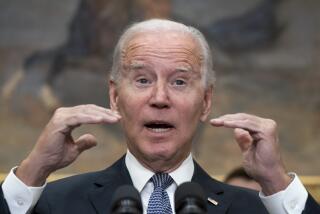In Hearing Deficit Alarms, We Turn a Deaf Ear to Some Positive Points
- Share via
While it’s true that the deficit twins--the budget deficit and the trade deficit--are important, the degree of concern currently expressed about them is exaggerated. Failure to reduce, let alone eliminate, the deficits may be imprudent. It would not be a disaster. The budget deficit is actually a less serious problem than is commonly assumed, and the trade deficit is already in the process of downward, if admittedly uneven, adjustment.
Three extenuating considerations are usually overlooked in the exaggerated rhetoric about the budget deficit. First, from the standpoint of the effects of budget deficits on credit markets and the international accounts, what matters is the consolidated budgets of the states as well as the federal government, not the federal budget alone. Because the states have amassed a substantial aggregate budget surplus in recent years, the consolidated deficit shrinks by $50 billion to $60 billion annually. Thus, the consolidated budget deficit for 1988 is about $100 billion, or about 2% of the U.S. gross national product--a figure not out of line with comparable figures in Japan, West Germany or Britain in recent years.
Second, the federal budget deficit exercises a braking effect on the otherwise strong political pressures in a pluralistic democracy for government spending to rise. In general, there is a small negative, but statistically significant, relationship between the size of the federal deficit in one year and the increase in federal spending in the succeeding year, net of inflation and net of debt service: A higher deficit in one year generally means a smaller increase than would otherwise occur in federal spending in the following year.
Finally, there is a substantial component of capital formation in federal government spending. Robert Eisner of Northwestern University has estimated this component at between $100 billion and $250 billion annually--the higher figure includes military procurement and military R&D.; It is not inappropriate to finance genuine and productive public infrastructure by government borrowing, because the infrastructure contributes to improved functioning of the economy and to widening the tax base, provided the capital expenditures have been wisely selected in the first place.
Of course, there remain good reasons for wanting to see the budget deficit reduced: for example, to keep interest rates down, to damp inflationary expectations, to restore fiscal policy as a credible instrument for countering recessions and, finally, to convey--internationally as well as domestically--the image of a responsible government that lives within its means. But these reasons are not matters of urgency, but rather of degree and of timing.
Turning to the other twin, there are encouraging signs that the trade deficit is already diminishing under the impact of two powerful market forces: the lowered exchange value of the dollar, and the discipline imposed on U.S. producers by having to compete for market share with foreign imports in the United States, and with foreign products in world export markets. As a result, the trade deficit in 1988 was about $20 billion below the approximate $152-billion deficit of 1987. By 1989, that figure will probably decrease by another $10 billion or more.
As the U.S. trade deficit declines, the adjustment problem this will create for the rest of the world will probably be considerably greater than that for the U.S. economy. It is too easy for our friends in Western Europe and East Asia to forget that, for the U.S. trade deficit to diminish, the trade surpluses of other countries--especially Japan, West Germany and the Asian newly industrialized countries--will have to decline; or they and other countries will have to experience trade deficits, or some combination of the two will have to occur. One finds much more criticism these days from European and Asian governments concerning the need for America to “do something about its trade deficit,” than recognition of what this implies for their own economies. And these implications remain whether the U.S. trade deficit is reduced by actions that affect the U.S. budget deficit, the U.S. savings rate or U.S. investment.
This prospect could be adversely affected by one development that has generally been overlooked. The attractiveness of U.S. assets, including real property, to foreign investors may propel a continued strong desire by foreigners to invest in the United States, in the process raise the dollar’s value and impede the downward adjustment of the U.S. trade deficit. It is worth bearing in mind that capital flows can generate a trade deficit, rather than being generated by it.
In sum, neither deficit warrants alarm. The federal budget and the trade accounts are less significant indicators of the economy’s health than are the maintenance of sustained real economic growth, high employment and low inflation.
More to Read
Inside the business of entertainment
The Wide Shot brings you news, analysis and insights on everything from streaming wars to production — and what it all means for the future.
You may occasionally receive promotional content from the Los Angeles Times.










